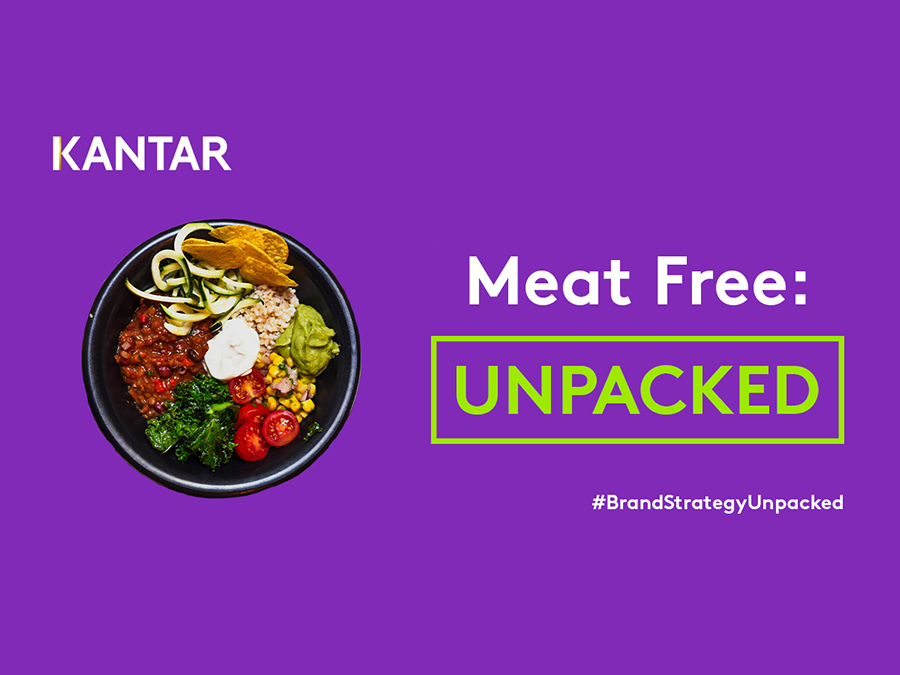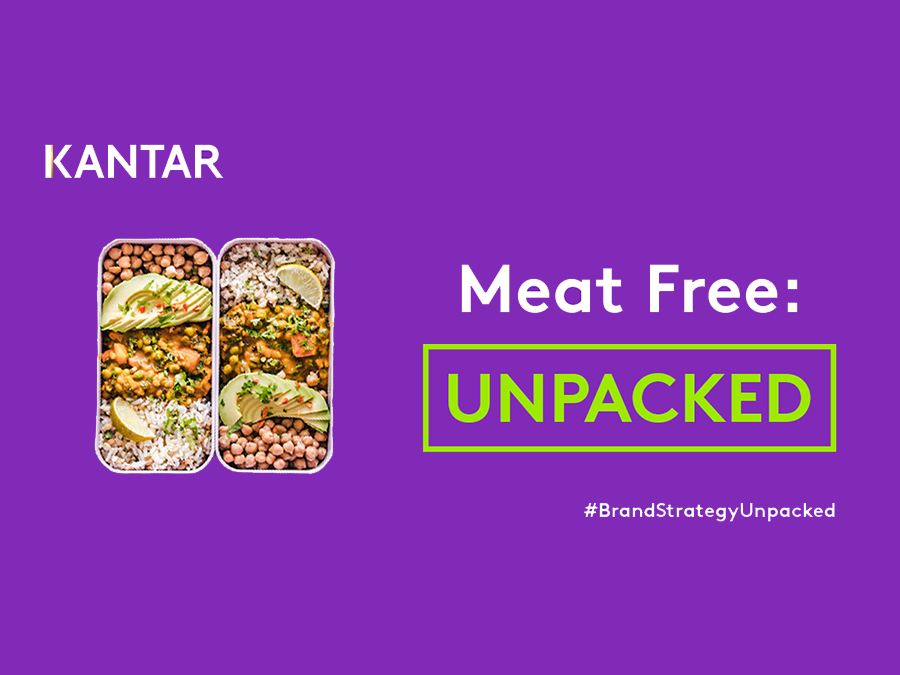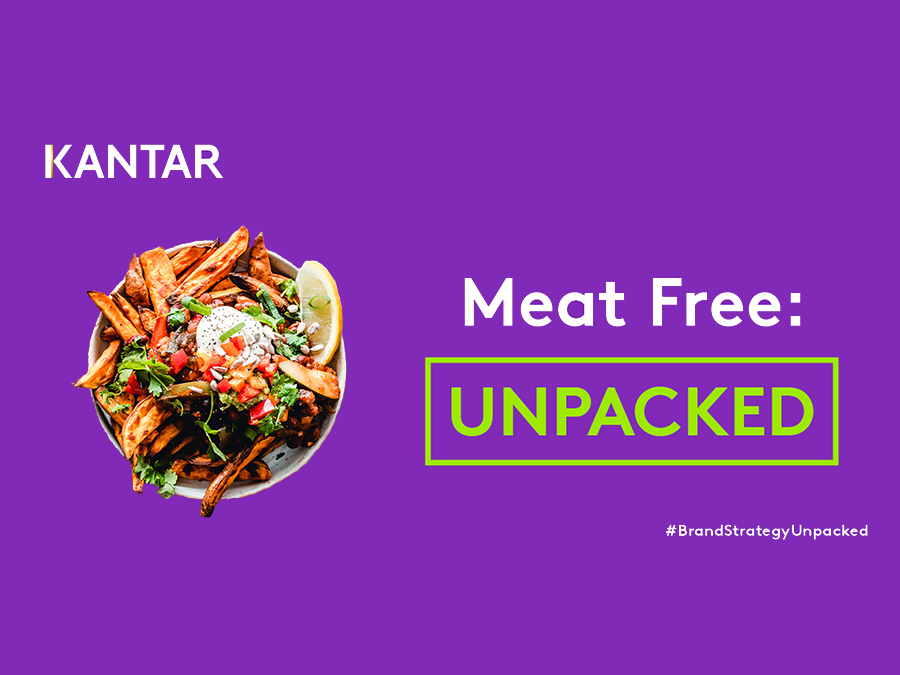Kantar’s #BrandStrategyUnpacked series has focused on understanding the meat-free market. Taking a #BrandStrategy lens to uncover opportunities for #brands and looking at ways to build #meaning, #difference and maintain #momentum in the market. Through this process, we uncovered that health and convenience are the biggest unmet consumer needs at the front of mind for UK consumers of meat-free products.
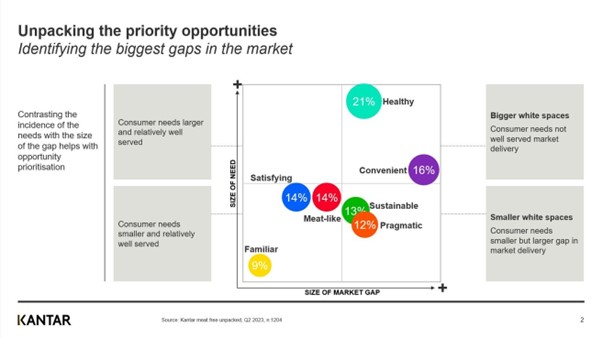
To further explore these gaps in #health and #convenience, we used social analytics to access consumer conversations linked to #meatfree and #plantbased products over the past 12 months.
Unlocking health means fighting perceptions of being #hyperprocessed
Our U&A data highlighted that consumers want healthy food without compromising on taste or ingredients. While the debate on transitioning to a fully plant-based diet is very vibrant on social media, with consumers highlighting the positives and challenges of a meat-free diet, there seems to be consensus that having some meat-free meals in the week is beneficial to our health.Consumers are opting for meat-free meals as they perceive them to be healthier options. However, there’s a view among consumers that plant-based and meat-free products are ultra-processed, which leads to concerns about ingredients and health benefits.
To further explore these gaps in #health and #convenience, we used social analytics to access consumer conversations linked to #meatfree and #plantbased products over the past 12 months.
Unlocking health means fighting perceptions of being #hyperprocessed
Our U&A data highlighted that consumers want healthy food without compromising on taste or ingredients. While the debate on transitioning to a fully plant-based diet is very vibrant on social media, with consumers highlighting the positives and challenges of a meat-free diet, there seems to be consensus that having some meat-free meals in the week is beneficial to our health.Consumers are opting for meat-free meals as they perceive them to be healthier options. However, there’s a view among consumers that plant-based and meat-free products are ultra-processed, which leads to concerns about ingredients and health benefits.
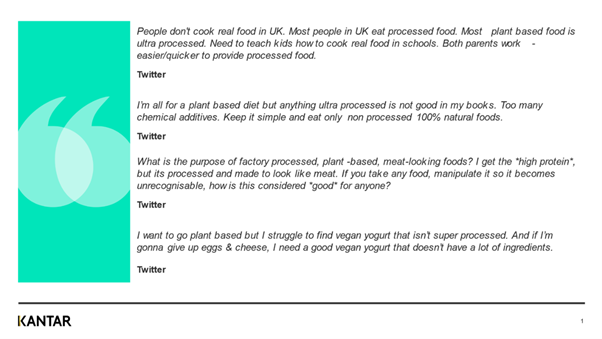
Consumers who are successfully integrating meat-free meals into their diets are bridging the existing health gaps in the market by adopting different strategies:
1. Developing their cooking skills: “Learning to make restaurant quality food at home is key to sticking to a meat free diet imho AND is how I brought my cholesterol down to healthy levels.” – Source Twitter
2. Measuring the health benefits: “I've been on an 'oil free, wholefood plant-based diet' for a month now & the difference is amazing (before I succumbed to mayo, crisps & croissants as well as oil for cooking) I've managed to lower my blood pressure, cholesterol & blood sugar. I'm eating loads & full of energy.”- Source Twitter
3. Adopting daily habits: “How about a little plant-based lunch inspo? My current favourite weekday lunch is salad leaves, pre-cooked puy lentils, roasted veg, home-sprouted seeds & a drizzle of dressing, with optional feta or vegan alternative. Such an easy & tasty way to boost plant protein & fibre” - Source Twitter
4. Focusing on making it look appetising: “All about the colours! That’s one of the best things about whole food vegan eats - the amount of antioxidants in them.” - Source Twitter
Could meat free brands adopt some of these strategies to amplifying the health benefits of their products?
Unlocking convenience means addressing variety and portability as well as availability and versatility.
What does convenience translate to for meat-free consumers? Our social analytics led us to four common challenges that consumers vent about online.
The first is #availability. “I’ve noticed Richmond meat free sausages have been so hard to find lately.” – Source Twitter For meat-free brands to successfully address the needs of modern consumers, their products must be readily available in various retail channels e.g. grocery stores, supermarkets, online retail stores and specialty health food stores. Importantly, in places that people will find them.
The second is #portability, our analysis of online conversations indicates a preference for pre-packaged meat-free products that are convenient for quick meals or as on-the-go snack options.
The third is a need for #variety in the meat-free food options available. Meat-free brands will need to cater to evolving consumer preferences, nutritional requirements, and dietary restrictions by offering a broad range of alternatives to counter the variety of meat-based products currently available to consumers.
The final challenge is around #versatility. Versatility could be achieved be through ingredients that allow consumers to create different textures and flavours to suit different taste preferences or ingredients that lend themselves to different methods of cooking e.g. stewing, stir fry, grilling or blending into smoothies. It also means catering for those who love meat and those who don’t. Ultimately, consumers of meat-free products want to be creative and explore the art of the possible in relation to meat-free recipes. Could targeted #innovation unlock solutions for meat-free brands?
To drive #relevance and stay #meaningful, brands will need to come up with innovative ways of addressing the existing market gaps. To design for #difference, these evolutions should be #authentic and #aligned with who they are and what your brand stands for. Unprompted, immediate, scalable sources of this information (like search and social data) enable your brand to connect with your audience at the right time to find answers.
If you want to know more about how insights from digital data can supercharge decisions around your brand, get in touch.
Look out for further ways to drive meaning and difference in this market in our next #BrandStrategyUnpacked installments. Follow the hashtag to make sure you don’t miss them.
